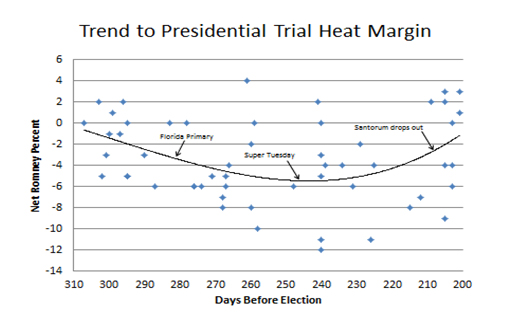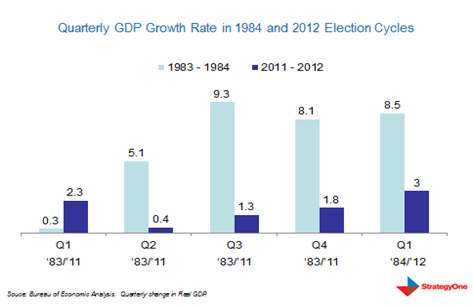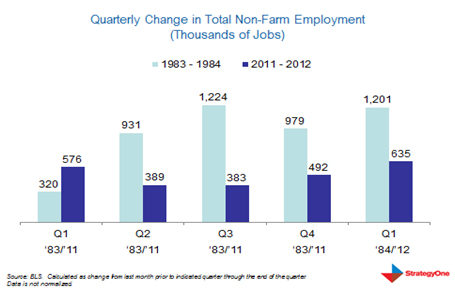Friends,
Mitt Romney may have rescued his fight for the nomination in Michigan with a narrow 3 point win on February 28th, but it was his nearly 12 point blow-out of Rick Santorum in Illinois on March 20th that probably ended the GOP nomination battle. What has gone unreported is that the President has been losing ground to Romney ever since that Illinois contest. So much so, that by the time Rick Santorum took to the podium on April 10th and announced he was suspending his campaign for the GOP nomination, Romney was moving close to near vote share parity with the President.
In the 2 weeks since that announcement, we have had muddled but largely negative economic news, government scandals and an emergent Mitt Romney. While there will be plenty of twists and turns in this campaign, we may look back at the moments before Romney's big victory in Illinois as the high water mark of the Obama reelection campaign.
Let's get straight to the head to head polling data and what we think it means. We took all public and private polling data since January of this year and plotted a regression trend line.

Mitt Romney and Barack Obama began the year virtually tied, but Romney's net standing against the President eroded as the divisive primary season wore on. Romney reached his lowest ebb, trailing Obama by nearly six points, in early March -- but his subsequent success in knocking out Rick Santorum has also helped close the gap against the President. The two are again back to approximate parity.
Obviously, at this point we are too far out to project, but the trend is in Romney's favor and he has had this momentum for 6 weeks.
- The GSA and Secret Service scandals are taking a toll on the President's reelection three ways; 1) they send a signal to voters that the administration is not on top of things (further eroding their sense that the President's team is competent,) 2) it is a distraction that detracts from the White House messaging strategy and 3) it further erodes trust in public institutions at a time of extremely high political alienation. None of this is good for a President running for reelection.
- The economy continues to stagnate and this is hugely problematic for the White House. In our last edition, we noted some increasing signs of green shoots in the U.S. economy, particularly in the unemployment report. However, data released over the last month show a possible slowdown in this recovery already. Ongoing concerns about Europe, rising gas prices and a rise in new jobless claims are all troubling. A stalled recovery continues to be the biggest obstacle to Obama's reelection. Additionally, we are experiencing the same Spring slowdown that appears to be the new normal in housing markets that had appeared to hit bottom this winter. Student loans are another troubling sector, where debt continues to compound to all-time highs.
- This is not 1984. And it is not even close. For a while late last year and early this spring, some pundits suggested that the Obama recovery may look a lot like Reagan's. Wrong. As the charts below show, this economic recovery is staggeringly slow compared to the one nearly 30 years ago. For example, GDP growth the last two quarters of 1983 were 5 to 6 times greater than the same period in 2011.

Similarly, job growth in the second half of 1983 was 2 to 3 times greater than in 2011.

- Enthusiasm for Obama may be receding among young voters. A recent Public Religion Institue/Georgetown University study found 18- to 24-year-olds do prefer Obama over a generic Republican, 48 percent to 41 percent. Still, this is a far different result than the 2008 election, where Obama did historically well among young voters, besting McCain 66 percent to 32 percent among 18- to 29-year-olds. Additionally, the favorability gap between Obama and Romney is closing: 52 percent of young adults in the survey had a favorable impression of Obama and 32 percent had a favorable impression of Romney. Note that horserace data for Obama vs. Romney isn't available from this survey fielded in March.
- President Obama lost Independents in 2010 and they have not come back. Like the last three elections, the key to this one will be Independents/swing voters. The President lost a sizable chunk of these voters with health care reform and a stagnant economy in late 2009. There is nothing in the data to suggest they are likely to move back to the President. For this reason, his overall approval rating remains stuck in the 44 to 48 percent range.
- He has more money. As Saturday's Washington Post story shows, the President has a large cash advantage (10 times) over Romney. Now, the GOP nominee will likely do well on the super Pac side but is unlikely to bridge the gap.
- He is the President. As the New York Times reported yesterday, there are distinct advantages to being POTUS and running for reelection. Not the least of which is blurring the lines between presidential visits to key swing states and political ones.
- He is more popular. The President has an enormous advantage in terms of personal popularity over Governor Romney. According to last week's WSJ/NBC News Poll, the President leads Romney by 30 points on "likability" and 25 points on "cares about average people." Romney needs to close the gap on these. He can win if the gap is 10 points but not if it is 30.
Our sense is that this race is 50/50 at this point in time. Both candidates are pretty weak. The advantage for the President is that Romney has high unfavorables (worst rating for any party nominee in nearly 30 years). The advantage for Romney is that 2012 remains an issue election rather than a personality one. Additionally, there is every indication that voters will look at this as a referendum on the President rather than a choice between two visions. That is why Romney needs a future-oriented narrative that clearly contrasts him with the President. We will know how well that is working in the weeks ahead.
Special thanks to John Zirinsky, Chris Blunt and Allison Quigley for their insights and contributions to this election monitor. Follow us on Twitter: @Steve_Lombardo.
(Please note that the author was an advisor to the Romney for President campaign in 2008 but is not affiliated with any campaign in 2012.)